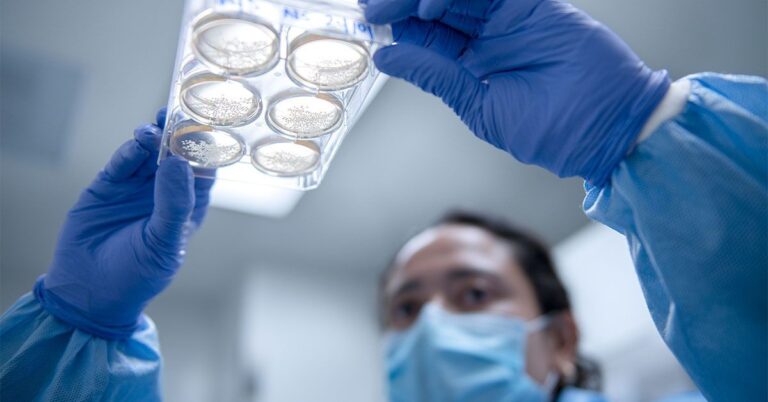In remarkable parallel, the more overgrowth a BCO demonstrated, the more overgrowth was found in social regions of the profound autism child’s brain and the lower the child’s attention to social stimuli. These differences were clear when compared against norms of hundreds and thousands of toddlers studied by the UC San Diego Autism Center of Excellence. What’s more, BCOs from toddlers with profound autism grew too fast as well as too big.
“The bigger the brain, the better isn’t necessarily true,” agreed Alysson Muotri, Ph.D., director of the Sanford Stem Cell Institute’s Integrated Space Stem Cell Orbital Research Center at the university. Muotri and Courchesne collaborated on the study, with Muotri contributing his proprietary BCO-development protocol that he recently shared via publication in Nature Protocols, as well as his expertise in BCO measurement.
Because the most important symptoms of profound autism and mild autism are experienced in the social affective and communication domains, but to different degrees of severity, “the differences in the embryonic origins of these two subtypes of autism urgently need to be understood,” Courchesne said. “That understanding can only come from studies like ours, which reveals the underlying neurobiological causes of their social challenges and when they begin.”
One potential cause of BCO overgrowth was identified by study collaborator Mirian A.F. Hayashi, Ph.D., professor of pharmacology at the Federal University of São Paulo in Brazil, and her Ph.D. student João Nani. They discovered that the protein/enzyme NDEL1, which regulates growth of the embryonic brain, was reduced in BCOs of those with autism. The lower the expression, the more enlarged the BCOs grew.
“Determining that NDEL1 was not functioning properly was a key discovery,” Muotri said.
Courchesne, Muotri and Hayashi now hope to pinpoint additional molecular causes of brain overgrowth in autism — discoveries that could lead to the development of therapies that ease social and intellectual functioning for those with the condition.
Co-authors of the study include Vani Taluja, Sanaz Nazari, Caitlin M. Aamodt, Karen Pierce, Kuaikuai Duan, Sunny Stophaeros, Linda Lopez, Cynthia Carter Barnes, Jaden Troxel, Kathleen Campbell, Tianyun Wang, Kendra Hoekzema, Evan E. Eichler, Wirla Pontes, Sandra Sanchez Sanchez, Michael V. Lombardo and Janaina S. de Souza.
Funding: This work was supported by grants from the National Institute of Deafness and Communication Disorders, the National Institutes of Health, the California Institute for Regenerative Medicine and the Hartwell Foundation. We thank the parents of the toddlers in San Diego whose stem cells were reprogrammed to BCOs.
Disclosures: Muotri is a co-founder and has equity interest in TISMOO, a company dedicated to genetic analysis and human brain organogenesis, focusing on therapeutic applications customized for autism spectrum disorders and other neurological disorders origin genetics. The terms of this arrangement have been reviewed and approved by the University of California San Diego in accordance with its conflict-of-interest policies. Eichler is a scientific advisory board member of Variant Bio, Inc. The other authors have no conflicts of interest to declare.
About the UC San Diego Autism Center of Excellence
The UCSD Autism Center of Excellence is a world leader in autism research. It has made pioneering discoveries that enable early detection and treatment of autism in infants and toddlers through innovative behavior and eye tracking tests. The Center’s groundbreaking discoveries on the developmental neurobiology of autism have led to fundamental knowledge of the molecular, cellular, and brain growth and function causes of autism.
About the Sanford Stem Cell Institute
The Sanford Stem Cell Institute (SSCI) is a global leader in regenerative medicine and a hub for stem cell science and innovation in space. SSCI aims to catalyze critical basic research discoveries, translational advances and clinical progress — terrestrially and in space — to develop and deliver novel therapeutics to patients. The SSCI is directed by Catriona Jamieson, M.D., Ph.D., a leading physician-scientist in cancer stem cell biology whose research explores the fundamental question of how space alters cancer progression.
This article was originally published by a today.ucsd.edu . Read the Original article here. .



